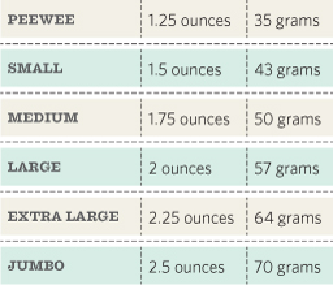Agriculture Reference
In-Depth Information
EGG SIZES
Naturally, the size of a hen's egg will vary with breed and age. The older the hen, the
larger the egg. But according to the USDA, eggs come in six standard sizes. The sizes
and their average weight are:
NUTRITIONAL VALUE
Often called the perfect food, one egg contains nearly all the nutrients necessary for life,
including vitamins A, D, E, beta carotene, folic acid, and omega-3—vitamin C is the ex-
ception. One large egg has roughly 70 calories (of which 12 percent are fat), 6.25 grams
of protein (about the same as an ounce of lean meat, poultry, fish, or beans), several an-
tioxidants (including lutein and zeaxanthin, which help prevent macular degeneration),
choline, which aids brain function, and lecithin (which may also help brain function).
And despite some health-food-store claims to the contrary, the color of the shell has no
influence whatsoever on the nutrition contained within.
Keeping Eggs Clean—and Cleaning Dirty Eggs
Ideally, eggs should be clean when you collect them. Despite the fact that a hen's vent
pops out poop as well as eggs—one bodily opening per customer—eggs come into the
world quite clean thanks to the bird's oviduct, which effectively closes of the intestinal
opening. (Ingenious, right?) But eggs gathered from a nest may still have dirty shells,
the result of either your hens tracking mud into their nests or, yes, chicken poop landing
on them after the fact.

